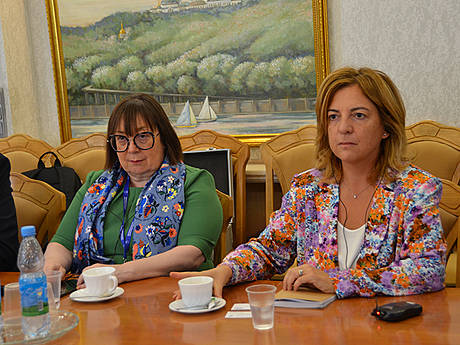
At the invitation of the Ukrainian side to Kyiv, a mission of European social partners from the European Confederation of Trade Unions led by the General Secretary of the ECU, Esther Lynch, and the General Secretary of SGI Europe, Valeria Ronzitti, visited.
They met with the head of AOEU, co-chair of the National Tripartite Social and Economic Council, Anatoliy Kinakh, to discuss the development of tripartism in Ukraine as one of the conditions for the integration path to the EU. The meeting was also attended by the head of the FPU, Hryhoriy Osovy, and the head of the KVPU, Mykhailo Volynets, who coordinated the visit. Ukrainian trade unions are full members of the European Confederation of Trade Unions.
ECU represents 45 million members from 93 trade union organizations in 41 European countries, as well as 10 European trade union federations. SGI Europe, along with BusinessEurope, is one of the three cross-industry social partners of the ECU. SGI Europe participates in the European social dialogue and has the right to vote in negotiations with trade unions and EU representatives at the highest level.

From the very beginning, the ECU and its member organizations condemned Russian aggression, severed all contacts with Russian trade unions, and started providing assistance to the Ukrainian people, including internally displaced persons in Ukraine and refugees abroad, supporting their integration into EU labor markets.
Anatoliy Kinakh emphasized the important role of social dialogue in Ukraine as a tool for effective reconstruction and economic development.
The business community leader announced that employers, together with the government and trade unions, prioritize preserving and developing the country's labor potential, psychosocial adaptation, and medical rehabilitation of war veterans, as well as modernizing the economy.
"This is our joint position with trade unions; we are working in this direction with the Cabinet of Ministers, parliament, and our international partners, including the International Labor Organization. We need to create conditions for the return of millions of our refugees home, so our efforts are directed towards supporting the Defense Forces of Ukraine, as well as the development of the economy and a shift from a resource-based to an industrial-innovative paradigm. Only in this way can we achieve economic self-sufficiency, increase the purchasing power of the domestic market, create new jobs, and achieve accelerated GDP growth," emphasized the head of AOEU.
He also noted that in this process, it is important to adapt standards and regulations to European ones, work on the decarbonization of industry, and increase the use of green energy sources.
Ms. Esther Lynch supported this idea, emphasizing that the common goal is to create a favorable environment for entrepreneurial activity and improve the quality of life for people.

"It is important that all important socio-economic decisions in Ukraine are made within the framework of social dialogue. Only then will they be long-term and effective," she stressed.
Ms. Lynch also expressed the wish that Ukrainian employers, as well as trade unions, be strongly represented at the European level.
The delegation of European social partners intends to return to Ukraine in February 2024 and continue working with all parties involved in social dialogue. In particular, they support the full resumption of the National Tripartite Social and Economic Council and its regular meetings.